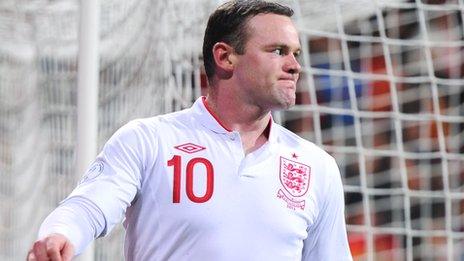Do I not like that: 20 years since Graham Taylor's World Cup failure
- Published
- comments
The day Graham Taylor resigned as England boss
"If you say 'Holland' to me, to this day I see David Platt running through on goal. I can't help it. When things don't go well as an England manager, it sticks with you for the rest of your life."
Wednesday, 13 October, 1993 is a date lodged firmly in the mind of former England manager Graham Taylor.
Three years into the job, three years after Bobby Robson, Paul Gascoigne and Gary Lineker had captured the nation's hearts by reaching the semi-finals of Italia 90, the unthinkable happened.
A controversial defeat by the Netherlands in Rotterdam, with Ronald Koeman scoring the opener minutes after he should have been dismissed for a professional foul, effectively ended England's chances of qualifying for the 1994 World Cup in the United States.
Taylor was left feeling "cheated".
Thanks to a warts-and-all documentary broadcast on Channel 4 a year later, images of Taylor's touchline fury and exasperation remain etched in England fans' collective memory.
Build-up
After a poor Euro 92 which saw England eliminated in the group stages after scoring just once in three games, Taylor's maiden World Cup campaign got off to a bad start.
Leads at home to Norway and then the Netherlands were painfully squandered, putting qualification in doubt.
"We played very well in both of those games and if we had won just one, which we deserved to, we would have been OK," Taylor remembers.
But the away double-header in May and June of 1993 did not go well either.
A draw in Poland and defeat away against leaders Norway in the space of four days left Taylor's side up against it. However, after an impressive 3-0 win over Poland at Wembley, England's fate was in their own hands going into the penultimate fixture in Rotterdam.
"We were a point above the Netherlands, with two games to go," says Taylor. "A draw would have been enough for us to qualify and we were as confident as we could expect to be."
The match
With captain Stuart Pearce injured and Lazio midfielder Paul Gascoigne suspended, Taylor made five changes to his side.
Off the pitch, he was called on to help smuggle in the documentary crew after they were denied access by the Dutch FA. The crew donned England tracksuits and carried their film equipment into the stadium in team kitbags.
Once the match kicked off, Leeds full-back Tony Dorigo - standing in for Pearce - smashed a long-range free-kick against the post, while Frank Rijkaard had an effort for the hosts disallowed in a goalless first half.
So far, so good.
The Koeman incident
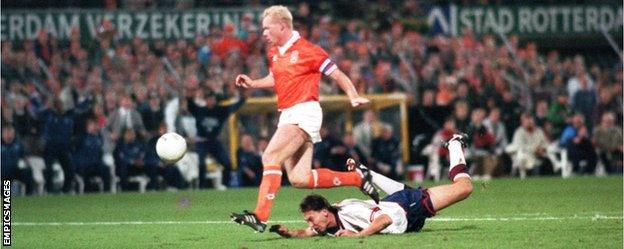
David Platt is fouled by Netherlands captain Ronald Koeman when clean through on goal
The match, England's hopes and Taylor's career were all transformed by a two-minute spell around the hour mark. Andy Sinton - on at half-time in place of Carlton Palmer - hit a long ball over the top for David Platt to run on to.
The England skipper was hauled to the ground by Koeman, but referee Karl-Josef Assenmacher decided to only show the Barcelona man a yellow card, rather than red.
The documentary was to show Taylor imploring the German official to send Koeman off, memorably asking fourth official Markus Merk: "What sort of thing is happening here?"
Even 20 years on, Taylor is incensed by the decision.
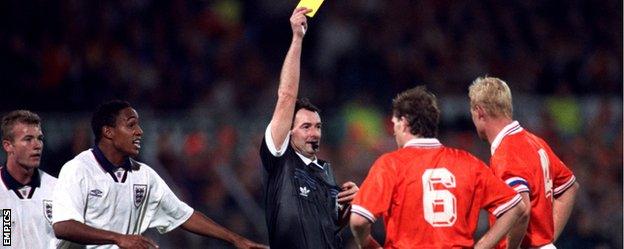
Referee Karl Josef Assenmacher chooses to show Ronald Koeman only a yellow card
"I could not believe what I was seeing. It was a goalscoring opportunity and Koeman should have gone," he says. "Fifa had made a very strong point in the weeks before the game that the denial of a goalscoring opportunity was a straight red card.
"He should have been sent off, absolutely."
After the game, Koeman admitted he had expected to be dismissed. Instead, Dorigo's free-kick was blocked by the advancing Dutch wall and two minutes later the home side were given a free-kick at the other end.
To heighten England's sense of injustice, it was Koeman who stepped up to score. His first effort was charged down by Ince, but he made no mistake second time around, with ITV commentator Brian Moore's prophecy of "he's going to flick one, he's going to flick one" proving accurate as he curled the ball into the top corner.
"That was when I lost it," Taylor says. "I honestly felt that we were being cheated. The referee was favouring the home side, I really felt that, as the free-kick we had blocked was exactly the same.
"The only other occasion in my career I felt like that was when I was in charge of Lincoln and we had a terrible penalty awarded at Birmingham. But this was obviously worse.
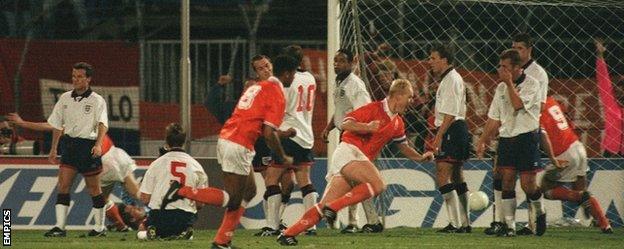
Ronald Koeman scores the free-kick which ultimately seals England's fate
"I lost the plot because I honestly and truthfully felt that England were being cheated in a vital game for the country.
"That was the worst I've ever been on a touchline. I'd never been like that before. But that is the one time I end up on film, so that's what people remember."
Paul Merson hit the post again but a second goal for the Netherlands followed, with Dennis Bergkamp scoring.
"The referee's got me the sack," Taylor told the linesman in the closing minutes. "Thank him ever so much for that won't you?"
Taylor concluded his reign with a futile 7-1 win in San Marino in November 1993, as the Netherlands secured qualification by beating Poland. Taylor resigned six days later.
"I try not to think about what would have happened next if Koeman had been sent off," Taylor says. "I'm sure we would have qualified for the World Cup and I probably keep my job. But that's life."
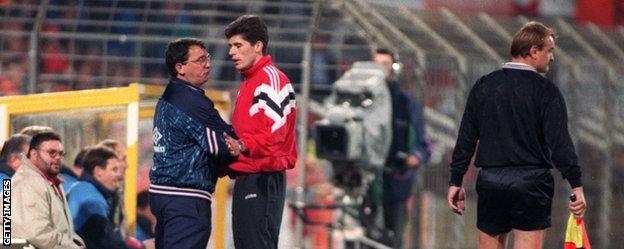
Linesman! Linesman! Fourth official Markus Merk restrains a furious Graham Taylor
THE DOCUMENTARY
Film-maker Ken McGill and his team had been recording Taylor and his team throughout the qualifiers. Taylor had agreed to take part in the programme as he hoped it would show the differences between club and international management.
But as results turned for the worse, the focus shifted to Taylor himself - the man in the 'Impossible Job', the title of the film which more than six million people tuned in to watch.

How the Sun newspaper portrayed Taylor following his resignation as England boss
"I didn't ever expect that we wouldn't qualify, I was arrogant enough to think that," admits Taylor.
"So I was keen to show the problems of being England manager. Then, as the results went on and we didn't qualify, I became more central to the documentary, quite rightly.
"You're the country's number one villain."
Taylor thought about cancelling filming before the trip to Norway in June 1993, but knew that the written press - who were already hostile towards him - would seize on it as an admission England would not qualify.
"One positive which came out of it is that people saw I was passionate about the job," Taylor says. "But I can't watch it. I put a little bit of the documentary on my computer recently but I couldn't watch it.
"I said to myself 'don't watch it Graham, because for the next week you'll be down'."
In the aftermath of his resignation - and being labelled a 'turnip' by the Sun newspaper in 1992 - Taylor considered leaving the country. Instead he stayed and rebuilt his club career, taking Watford back to the top flight.
The documentary was a hit. But McGill, who has also made films with Gascoigne, Lennox Lewis and Ian Botham,, external has mixed feelings 20 years on.
Taylor may have been able to return to work, but his assistant Phil Neal was criticised for being 'a yes man' after the documentary was broadcast. At the time, he was England's most decorated player, yet his managerial career never recovered, with a brief spell in charge of Manchester City in 1996 his last job as a coach.
"At the time I felt terrible," McGill admits, "not only for Graham but I also feel responsible for Phil not being able to earn a living in football any more.
"If it wasn't for Graham's help, we would not have been able to film in Rotterdam. We would have missed all of that drama.
"I found it hard to take the consequences of the film. But there is nothing I would change. It is a piece of honest film-making."
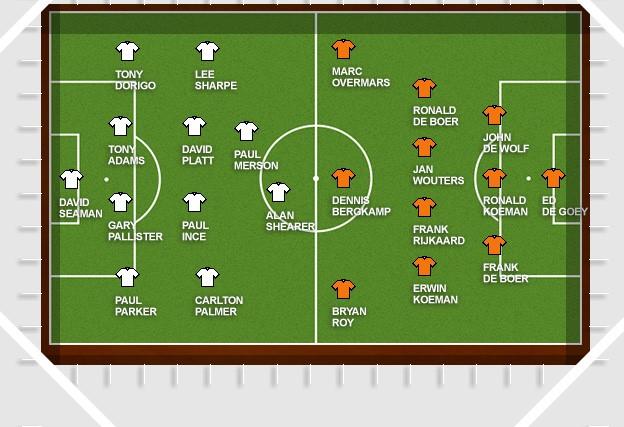
How the two sides lined up on Wednesday, 13 October, 1993
- Published11 October 2012
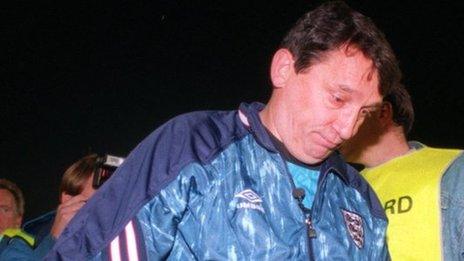
- Published12 September 2013
